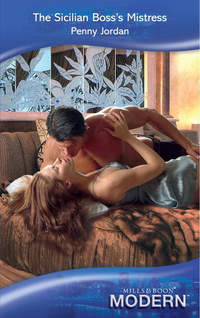
Полная версия
Second Time Loving


Celebrate the legend that is bestselling author
PENNY JORDAN
Phenomenally successful author of more than two hundred books with sales of over a hundred million copies!
Penny Jordan’s novels are loved by millions of readers all around the word in many different languages. Mills & Boon are proud to have published one hundred and eighty-seven novels and novellas written by Penny Jordan, who was a reader favourite right from her very first novel through to her last.
This beautiful digital collection offers a chance to recapture the pleasure of all of Penny Jordan’s fabulous, glamorous and romantic novels for Mills & Boon.
About the Author
PENNY JORDAN is one of Mills & Boon’s most popular authors. Sadly, Penny died from cancer on 31st December 2011, aged sixty-five. She leaves an outstanding legacy, having sold over a hundred million books around the world. She wrote a total of one hundred and eighty-seven novels for Mills & Boon, including the phenomenally successful A Perfect Family, To Love, Honour & Betray, The Perfect Sinner and Power Play, which hit the Sunday Times and New York Times bestseller lists. Loved for her distinctive voice, her success was in part because she continually broke boundaries and evolved her writing to keep up with readers’ changing tastes. Publishers Weekly said about Jordan ‘Women everywhere will find pieces of themselves in Jordan’s characters’ and this perhaps explains her enduring appeal.
Although Penny was born in Preston, Lancashire and spent her childhood there, she moved to Cheshire as a teenager and continued to live there for the rest of her life. Following the death of her husband, she moved to the small traditional Cheshire market town on which she based her much-loved Crighton books.
Penny was a member and supporter of the Romantic Novelists’ Association and the Romance Writers of America—two organisations dedicated to providing support for both published and yet-to-be-published authors. Her significant contribution to women’s fiction was recognised in 2011, when the Romantic Novelists’ Association presented Penny with a Lifetime Achievement Award.
Second Time Loving
Penny Jordan

www.millsandboon.co.uk
MILLS & BOON
Before you start reading, why not sign up?
Thank you for downloading this Mills & Boon book. If you want to hear about exclusive discounts, special offers and competitions, sign up to our email newsletter today!
SIGN ME UP!
Or simply visit
signup.millsandboon.co.uk
Mills & Boon emails are completely free to receive and you can unsubscribe at any time via the link in any email we send you.
CHAPTER ONE
NOT far now. Angelica had just driven through the last village on Tom’s list, and, according to the route he had worked out for her, the lane to the cottage should only be a couple of miles ahead of her.
She was glad that the drive from London was nearly over. Her back was stiff with tension, her eyes gritty and tired. Tired…She smiled cynically to herself. Eighteen months ago, even twelve months ago, if anyone had told her that tiredness, exhaustion, both physical and mental, and most of all emotional was going to overrun and dominate her entire life she would have laughed at them. But then she hadn’t known what she knew now: that this numbing, destructive, all-encompassing form of exhaustion, this longing to close her eyes, curl up in a small ball to sleep and go on sleeping was a form of depression as dangerous and invasive in its way as its far more publicised and recognised cousins.
She had learned an awful lot during these last eighteen months though, too much perhaps, and certainly a good deal that she would rather not have learned. Her mouth twisted painfully. She ought to have remembered that old adage about there being no fool like an old one; not that at twenty-eight she was old precisely, even though if, right at this moment, she felt as though she were inhabiting the body of a woman thirty years her senior rather than one supposedly at the height of her mental and sexual peak.
Her sexual peak. The twist of her mouth became even more pronounced. In these days of increasing concern over and responsiveness to the growing threat of AIDS, it was perhaps not the stigma it had once been to be a woman of over twenty-one with so limited a sexual history that she was still actually a virgin, but it was still something she preferred to keep to herself; a vulnerable Achilles’ heel, in someone who, to the rest of her small world at least, was the subject of admiration and envy.
When she had first taken over her father’s ailing business, manufacturing an old-fashioned brand of face cream and cleansers supplied on a mail-order basis to a very limited list of customers, she had done so because she had no alternative. When she was fresh from serving her articles with a firm of accountants, and had just passed her exams, her father’s sudden heart attack and death had left her mother solely dependent on an income from a company which had become more and more precariously financially based.
It had been a chance conversation with a friend which had led to her turning round the whole focus of the company, so that instead of marketing its traditional products Angelica had taken the huge risk of completely reorganising the company and marketing products which were based entirely on natural ingredients.
There had been no time for careful market research; no time to do anything other than make her decision and then act upon it.
The success of the company was something that sometimes surprised even her. It had expanded to such an extent that she had had to invest in new factory premises and an increased work-force, and had taken on the kind of financial and emotional burdens that went with economic success.
And yet she had thrived on it, revelled in the challenge. When others flagged, she had laughed at them; when others doubted, she had stuck to the force of her own convictions and been proved right.
Her mother was now living very comfortably indeed in an elegant flat in Brighton, her future secure; Angelica herself had a tiny but very valuable mews cottage, tucked away from view in one of London’s precious and increasingly rare oases of peace and quiet. All of the mews houses had separate garages, and the mews itself had no vehicular access to the pretty cobbled courtyard they all shared.
On admittedly rare warm summer weekends, it was not unusual to see all its inhabitants breakfasting al fresco in the courtyard in a manner more reminiscent of France than Britain, on delicacies supplied by a local delicatessen.
It had been on one such morning that she had first met Giles. He had been living in one of the cottages on a temporary basis. He had told her that he had been loaned it by some friends who were spending six months in the States.
Later she had discovered that this was not the truth; that in fact the house belonged to the parents of his previous girlfriend, and that he had casually moved in and refused to move out, claiming the property as his by virtue of his relationship with their daughter. Giles had had a gift for distorting the truth, for bending it to suit his own selfish purposes, and she, like the fool she was, had been completely taken in by him.
It didn’t help that her friends had been equally easily deceived, that they had been equally stunned by the truth. They had quickly and determinedly rallied around her when the blows had fallen, not singly, but in a massed attack which had left her feeling as though her heart and her mind had been beaten to a jelly that made it impossible for her to rationalise herself out of her anguish and suffering.
And yet she had been so lucky…so very lucky. If her mother hadn’t broken her arm just before she and Giles were due to take that holiday in Provence, if she hadn’t returned unexpectedly to London that evening to collect some papers she had needed…If Giles hadn’t been arrogant and reckless enough to spend not just the evening but the night as well with someone else, and if she hadn’t seen that someone else leaving his house in the early hours of the morning, she might never have discovered the truth—or at least she might only have discovered it when it was too late.
And the worst of it was that to her own mind at least she had been so trusting, so idiotic, that she had actually believed that he loved her, that she had never questioned why such a charming and good-looking man of twenty-seven should actually want a woman like her—a woman who had never really had time to play and enjoy life, a woman who had dedicated herself to her business life, a woman who took her responsibilities so seriously that they were the prime focus of her whole life.
She had been a fool.And it didn’t help knowing that she was far from the first woman Giles had deceived. Indeed he had made quite a career out of it, safe in the knowledge that his other victims, like her, would not want to broadcast their idiocy.
It made it no better knowing that she had willingly allowed him to dictate the course of their relationship, to sweep her off her feet, insisting that he loved her, that he wanted to spend the rest of his life with her. That holiday in Provence had been going to be a time of pre-wedding intimacy, a whole month of getting to know one another, of becoming lovers, of committing themselves to their shared future.
She had been so blinded by wonder, by the thrill of believing that he loved her, that she hadn’t even looked for any flaws in him.
Tom had told her gently that she mustn’t blame herself; that there came a time in everyone’s life when they were vulnerable to that kind of foolishness—that she had been lucky because fate had stepped in and saved her before it was too late.
As her solicitor he had felt bound to point out to her that, had she and Giles actually been married, she could have suffered far more than the emotional destruction of her life. She could have virtually lost if not everything she had worked for then certainly a good part of it.
That had been a bitter pill to swallow: the knowledge that Giles, simply because of her imagined wealth, had callously and cold-bloodedly set out to deceive her into believing he loved her. He had wanted, not her, but the company. His desire had not been for her, but for money.
The humiliation of that knowledge was something she thought she would have to carry for the rest of her life—that and the knowledge that she had been such a fool. Falling in love with a cheat was something a girl in her teens could be forgiven, but a woman of her age ought to have known better, ought to have realised…What? That it was impossible for a man to fall instantly and completely in love with someone like her, a woman who, while passably attractive, had hardly the kind of head-turning looks that had men falling over themselves for her attention.
Even now she still couldn’t understand why it had happened—why she had so easily allowed herself to be deceived. She shivered suddenly, her flesh going cold as she dwelt on all she had put at risk—not just her own future, but her mother’s as well and those of her employees, and all for what? For the meaningless smiles and even more meaningless flattery of a man who had cold-bloodedly set out to use her.
Was she so emotionally bereft of inner strength, so vulnerable, so in need of believing herself loved that she had not had the sense to see what Giles really wanted? Was she so much of an emotional fool that she had really believed him when he’d sworn he loved her, when he’d told her he wanted her as his wife? Why hadn’t she questioned him more deeply? Why hadn’t she suspected?
Because it had never occurred to her that she might fall into that kind of trap, that a man might want her simply because of the financial gain she represented.
That was what hurt her the most of all, she recognised: that she had been stupid enough to believe herself loved when all the time Giles had been laughing at her gullibility, when he had been secretly assessing her financial worth. All those lies about wanting their lovemaking to be perfect, about wanting to take her away somewhere where he could have her all to himself. All those lies, which she had believed, when the truth was that he had already been sleeping with someone else.
In New York women employed private detectives to search into the lives of their menfriends. She had thought them cynical and cold-blooded. Now she was not so sure.
Facing up to the knowledge that she had made such a fool of herself had been the hardest thing she had ever had to do. She had been remorseless with herself, not allowing herself to hide from the truth, making herself confront her own frailties, her own stupidity, making herself see that she had craved being loved so much that she had almost eagerly thrown away her intelligence and self-respect.
Up until Giles’s arrival in her life, she had considered herself to be fulfilled and as reasonably happy as any human being could expect to be.
Marriage, children—these were secret dreams she had kept tucked away in a private corner of her mind. She had looked around at the relationships of her friends, seen how very difficult it was in this frenetically paced age merely to find the time to devote to developing and then cosseting emotional bonds, and had told herself prosaically that maybe later in her life she would opt for a sensible, unpassionate marriage to some kind, bland man who would share her desire for children and stability, but that that time had not come yet and that she was presently more than content with her life, that the wild love-affairs indulged in by some of her friends were not for her and more to be looked upon with mild amusement than envy, that the trauma of intense emotional relationships were never worth the expenditure of time and emotion that went into them.
And then she had met Giles, and he had turned her whole world upside-down, and she, fool that she was, had helped him.
Well, she was suffering for that self-indulgence now.
‘Exhaustion’was her doctor’s pithy diagnosis of the enervating malaise that had drained her to the point where she felt she could simply no longer function as the person she had once been.
There had been a good deal of shocked reaction from her friends. The words ‘yuppie flu’ had floated sympathetically on the air. None of them had been tactless enough to suggest she was suffering from something as unfashionable as the misery caused by a broken heart, especially as it was twelve months since she and Giles had parted. Modern women did not have hearts that broke; they were far too sensible, far too mature. They wisely assessed the advantages and disadvantages of every relationship they entered, not having the time to waste on those that were unprofitable. If only she had followed that sensible course…But she hadn’t, had she? And she was left, not only with the pain of being deceived by someone she had thought cared for her, not only with the anguish of her own misery and her bruised pride, but she was also having to contend with the realisation that she was not the woman she had always supposed; that she was not the mature, wise creature she had always prided herself on being; that she was in fact as vulnerable as the rest of her sex when it came to her deepest emotions and needs.
Which was why, on the insistence of her doctor, she was taking this enforced break. It had been Tom, her solicitor, and one of her closest friends, who had offered her the use of the Pembrokeshire cottage he had recently inherited from an uncle.
‘It’s virtually in the middle of nowhere, five miles from the nearest village, but the countryside is wonderful. I went down there never having even seen the place. I’d already made up my mind to sell, but once I did see it…Well, I’ve decided to keep it, and it’s yours for just as long as you need it, Angelica.’
She had wanted to protest that she wasn’t an invalid, that she didn’t need it, that she didn’t need anything or anyone; that was how raw and sore she still was inside, but she had known she would have been lying. She badly needed somewhere to crawl away into and hide, somewhere where she could lick her wounds and recover at her own pace.
She could leave the business in the capable hands of Paul Lyons, her second-in-command; she knew that.
She didn’t love Giles any more. How could she? The man she had thought she loved had never actually existed, but that didn’t stop her heart from thumping crazily every time she saw a man with fair, sun-streaked hair and blue eyes. It didn’t stop her from waking up alone at night with her face stiff from the drying salt of her tears. It didn’t stop her from feeling it was impossible for her to face the world, from feeling that everyone who looked at her knew what a fool she had been.
Tom was right—six weeks away from London, living simply and on her own, was probably just what she needed to get things back into perspective, to recoup her old energy and determination.
They had had lunch together yesterday, and then he had gone back to the house with her, to make sure that she had got the route clear, he had said, but she had known that he was worried about her. That knowledge had warmed her. She and Tom had been friends for a long time. Her mother adored him, and often hinted that they would make a good couple, but, close though they were, both of them had separately and mutually acknowledged that their relationship was more akin to one of brother and sister, that their emotional bonding was such that it precluded any possibility of sexual desire. Tom had recently fallen in love, and she liked his new girlfriend very much.
She had broken her journey in Ludlow to admire the pretty town and have something to eat, and had perhaps, she recognised, lingered there rather longer than was wise, because now it was dark; the country road was unlit, and she was glad of the absence of any other traffic, otherwise she suspected she would have irritated the other drivers by her hesitancy as she searched the roadside for the turn-off for the cottage.
She was becoming increasingly anxious to find it, not just because it was late and she was tired; for the last few miles she had been feeling increasingly unwell. Her stomach hurt, she felt sick, and she was pretty sure that the meal she had eaten in Ludlow was to blame.
She had lost almost a stone in the twelve months since she had parted from Giles. Her friends were beginning to warn her that there was such a thing as becoming too slender, and that her five-foot-seven frame was beginning to look a touch gaunt. She had been forced to acknowledge the truth of their remarks. She could see new hollows at the base of her throat, could feel a new prominence in the bones of her hips, a new slackness in the waists of her discreetly elegant skirts. There were shadows beneath her eyes turning them from grey to haunted violet, the soft black silkiness of her hair was beginning to lose its gloss, and she knew that the emotional devastation she had suffered was beginning to show its physical signs on her body.
She had promised herself that she would spend this break getting herself fit; walking, eating sensibly, living simply and wholesomely instead of picking reluctantly at meals she never seemed to finish and keeping herself closeted in the unhealthy stuffiness of her centrally heated office.
The cottage was spartan, Tom had warned her, but they were having a good summer, and she had felt a sharp relief at the prospect of living alone somewhere where no one would expect her to make any effort to keep up the appearance of the glossy, self-sufficient career woman.
That was the trouble with being a woman, she reflected muzzily; nature had not designed them to be self-sufficient. Nature had ensured that they would always inherit those genes which made them yearn to share and nurture. Nature was a fool and a cheat—just like Giles—and she was a bigger fool for having allowed herself to be deceived.
Too late she saw the turning and had to reverse the car. Doing so made her feel horribly faint and sick. Her head felt as though it were stuffed with cotton wool, while her stomach…
As she drove down the lane between high, hedge-topped banks, she prayed that she would make it to the cottage before her stomach rebelled completely.
She could feel sweat breaking out on her skin, the kind of sweat that heralded a bout of sickness, and then mercifully as she turned a corner the car’s headlights picked out the low stone-built cottage. Longer than she had expected, and was her brain playing tricks on her or did it seem as though it had two separate front doors, and what was that hedge doing in the middle of the front garden?
As she stopped the car, she realised muzzily that it wasn’t one cottage but a pair of semis, in fact. She just had time to realise that Tom hadn’t warned her that the cottage didn’t stand completely alone before violent cramps seized her stomach.
Throwing open the car door, she virtually fell out of the driver’s seat, and was immediately and violently ill.
Shivering and shaking, her body doubled up with the intensity of the violent spasms racking her stomach, she prayed they would abate for long enough for her to make it to the privacy of the cottage. Not that there was anyone to see her. No lights shone from the windows of either cottage, no sound apart from the chattering of her own teeth spoiled the perfect silence. She was alone—completely alone…
Tensely she straightened up, relieved to discover that, while she felt appallingly weak, the pain and nausea had faded—at least for the time being.
Hurrying back to the car, she extracted her bag, and found the large, old-fashioned key to the cottage. Not bothering to lock her car, she opened the wooden gate and hurried down the path to the front door.
The effort of trying to control the pain in her stomach was making her feel positively light-headed, she acknowledged as she tried shakily to insert the key in the lock. A horrible sense of weakness overwhelmed her, the return of the unbearable cramping agony in her stomach bringing a film of sweat to her forehead, and nausea burning in her throat.
As the pain increased, she dropped the key, gripping her stomach, all her concentration demanded by the intensity of her agony.
As she cried out, and half collapsed on to the ground in front of the cottage, she was dimly conscious of a car engine fading into silence somewhere in the distance, but she was far too occupied with her own physical needs to pay it much attention.
She had just finished being violently sick, tears of pain and shock pouring down her face, her throat raw with the violence of her retching, her body still huddled on the ground, as she fought against the dizzying waves of agony beginning to build up inside her again when she heard an irritated male voice demanding from behind her, ‘What the devil’s going on?’
And then as she tried to turn her head, too exhausted and in too much pain to question either the man’s arrival or his anger, he obviously realised for himself how ill she was, because he made a sudden sound of enlightenment and then crouched down beside her, saying in a much kinder tone, ‘It’s all right. No, don’t try to move. What happened? Food poisoning?’
The cramping pains were increasing again. Angelica only had time to nod before they became so violent that she stopped fighting to stay conscious and let herself slide down into the waiting darkness, vaguely conscious of someone lifting her, carrying her, speaking to her before the darkness completely closed over her.







